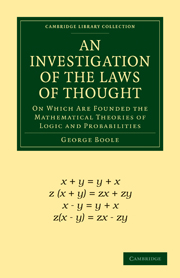 An Investigation of the Laws of Thought
An Investigation of the Laws of Thought Published online by Cambridge University Press: 05 November 2011
OF SECONDARY PROPOSITIONS, AND OF THE PRINCIPLES OF THEIR SYMBOLICAL EXPRESSION.
1. The doctrine has already been established in Chap, iv., that every logical proposition may be referred to one or the other of two great classes, viz., Primary Propositions and Secondary Propositions. The former of these classes has been discussed in the preceding chapters of this work, and we are now led to the consideration of Secondary Propositions, i. e. of Propositions concerning, or relating to, other propositions regarded as true or false. The investigation upon which we are entering will, in its general order and progress, resemble that which we have already conducted. The two inquiries differ as to the subjects of thought which they recognise, not as to the formal and scientific laws which they reveal, or the methods or processes which are founded upon those laws. Probability would in some measure favour the expectation of such a result. It consists with all that we know of the uniformity of Nature, and all that we believe of the immutable constancy of the Author of Nature, to suppose, that in the mind, which has been endowed with such high capabilities, not only for converse with surrounding scenes, but for the knowledge of itself, and for reflection upon the laws of its own constitution, there should exist a harmony and uniformity not less real than that which the study of the physical sciences makes known to us.
To save this book to your Kindle, first ensure no-reply@cambridge.org is added to your Approved Personal Document E-mail List under your Personal Document Settings on the Manage Your Content and Devices page of your Amazon account. Then enter the ‘name’ part of your Kindle email address below. Find out more about saving to your Kindle.
Note you can select to save to either the @free.kindle.com or @kindle.com variations. ‘@free.kindle.com’ emails are free but can only be saved to your device when it is connected to wi-fi. ‘@kindle.com’ emails can be delivered even when you are not connected to wi-fi, but note that service fees apply.
Find out more about the Kindle Personal Document Service.
To save content items to your account, please confirm that you agree to abide by our usage policies. If this is the first time you use this feature, you will be asked to authorise Cambridge Core to connect with your account. Find out more about saving content to Dropbox.
To save content items to your account, please confirm that you agree to abide by our usage policies. If this is the first time you use this feature, you will be asked to authorise Cambridge Core to connect with your account. Find out more about saving content to Google Drive.